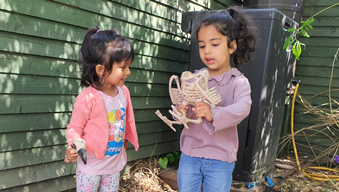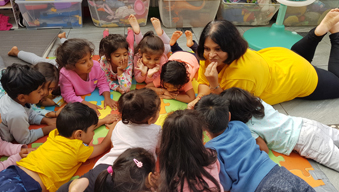





For advanced learners aged nearly 5, Communication & Language continues to play a vital role in deepening thinking, learning, and social understanding. At this stage, children use language to reason, explain ideas, negotiate, and reflect on experiences. Rich conversations, storytelling, and collaborative play help them expand vocabulary, refine sentence structure, and express complex thoughts with confidence.
Strong communication skills also enhance reading comprehension, problem-solving, and emotional intelligence - enabling children to listen attentively, articulate opinions respectfully, and engage meaningfully with peers and adults across all areas of learning.

Our two confident children engaging in a thoughtful outdoor conversation, demonstrating advanced Communication & Language skills. One child is holding a model skeleton of a bird, explaining or describing it to the other child, who listens with clear interest and curiosity.
This interaction highlights key features of advanced communication for children in our nursery:

A team huddle can also take place when you are lying on the floor!
In this activity, the practitioner is discussion something that the children are interested in.
This example of high-quality teaching interaction beautifully illustrates a loving shared moment of communication and curiosity that occurs in our nursery frequently.
Parents can support advanced communication and language development by encouraging deeper conversations, storytelling, and reasoning. Ask open - ended questions that invite explanation and reflection, such as “Why do you think that happened?” or “How could we solve this?” Reading longer stories, discussing characters’ feelings, and exploring new vocabulary together enhance comprehension and expressive skills.
Encourage your child to share opinions, listen to others, and use language to plan, negotiate, and problem-solve. These rich, thoughtful interactions strengthen confidence, critical thinking, and articulate communication - key skills for school and beyond.

| Mon - Fri | 07:30 - 18:30 |
| Sat | Closed |
| Sun | Closed |
Our nursery through our eyes
This video celebrates how children see their nursery world with imagination, confidence, and joy.
“Communication leads to community, that is, to understanding, intimacy and mutual valuing.” - Rollo May


